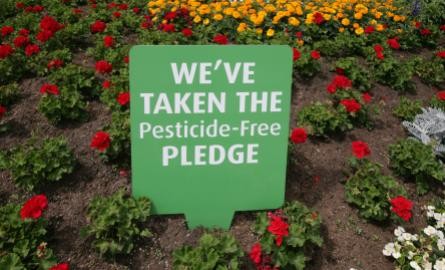Non-Toxic Insecticide Alternatives

Bothered by bugs in your garden? Before you reach for a can of insecticide, pause and reflect a minute. First, remember that some insects are beneficial. Others are simply harmless, even if they swarm around a plant. Chemical sprays are not the only way to keep bugs from chewing holes in vegetables or killing flowering plants. There are plenty of alternative repellents and pesticides. However, if insects become a problem, here are some tips and solutions to clear out a garden.
Basics of Insecticide Use
If you can handle the problem yourself, consider the least toxic option, read the label, and closely follow directions. Remember, no single insecticide should be used for every pest. Purchase commercial insecticides only in small amounts, for specific insects on particular plants or garden areas, and never store large quantities of harmful chemical pesticides in the house. Keep close records of insecticide usage in case of poisoning or property damage. For expert help, ask a local landscaping pro or cooperative extension office about your pest problem.
What's wrong with the most popular insecticides?
Roundup (glyphosate) and AAtrex (atrazine) are the most popular pesticides for home use.
- Glyphosate may cause human genetic damage. A University of Caen study linked it with threats to human sex hormones and placental cells, as well as increased rates of miscarriages. It also may cause blurred vision, nausea, headaches, and dizziness. Other studies connected the pesticide to a large tadpole die-off.
- The Environmental Protection Agency is considering banning atrazine. It has caused hormonal imbalances in lab animals and may have other biological side effects.
What are some natural alternatives for garden pest control?
Try these natural, non-toxic (to humans) repellents. Most of the following suggestions won't actually kill the bugs but will help keep them away from your garden. And that’s the goal after all, isn’t it?
Plants helping other plants. Plant marigolds and feverfew around vegetable and flower gardens. Most insects dislike the strong odor. Some types of pungent basil and sage also repel a variety of insects. Chives and nasturtium can keep aphids off rose bushes. Borage will keep worms out of tomatoes. Rosemary keeps away mosquitoes.
Foil insects. Strips of aluminum foil under vegetables will reflect light and confuse insects. The reflected light can also help vegetables grow.
DY natural ant inseciticdes. Ants may be annoying, but their threat to gardens is debatable. They dig around and loosen soil, which improves air and water circulation but might kill fragile young plants. Home insecticides for ants include oranges or hot chilies diluted in water, and concentrated vinegar. Pour each mixture onto an anthill.
Homemade sprays. If other home remedies fail, make a general homemade insecticide solution. For centuries, gardeners have put soap on plants to repel insects. Try diluting a one-percent solution of a simple dishwashing soap with minimal dyes and fragrances. Spray thoroughly and repeatedly on plants. Another popular solution is a mix of onions, garlic and pepper, but it has not been scientifically proven.
Natural chemical solutions. If you have to resort to commercial insecticides, look for non-toxic plant-derived products. Sabadilla may irritate your eyes and throat, but it is not considered toxic to humans. Neem extract is non-toxic and may have beneficial medical uses (but don't drink the insecticide mixes).
Looking for a Pro? Call us (866) 441-6648

Landscaping Average Costs
Landscapers Experiences

Mouse Control Included Traps And Exclusion

The Best Pest Control Service For My New Florida Home



